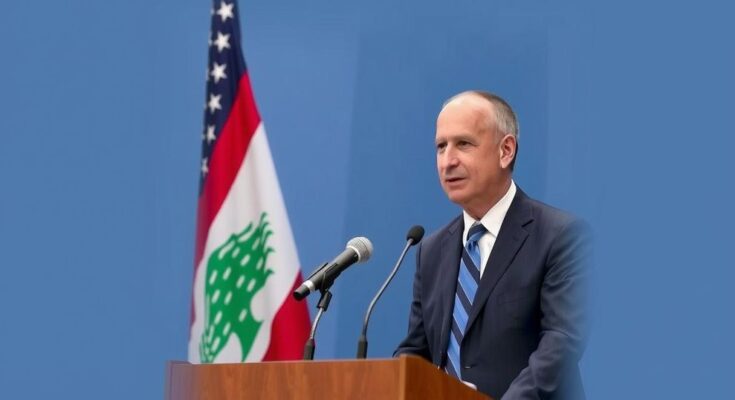The U.S. Ambassador to Lebanon, Lisa Johnson, is reportedly promoting an internal uprising against Hezbollah while the group is engaged in conflict with Israel. Through discussions with Lebanese politicians, she is encouraging the public to act, suggesting that current conditions favor such a movement. Johnson’s strategy includes supporting the election of military leaders and inciting divisions within Lebanese society, raising concerns about escalating sectarian tensions.
A high-ranking Lebanese security source disclosed to Al-Akhbar newspaper that U.S. Ambassador to Lebanon, Lisa Johnson, is actively pursuing an agenda aimed at facilitating a “post-Hezbollah era” in Lebanon. Johnson is purportedly engaging with Lebanese political figures to advocate for an internal uprising against Hezbollah amidst its ongoing conflict with the Israeli Army. In her discussions, she reportedly stated, “Israel cannot achieve everything through war; it’s time for you to do your part and launch an internal uprising under the banner of ‘Enough.’” Furthermore, the ambassador emphasized the need for the Lebanese populace to express their desire to dismantle Hezbollah’s influence, referencing the political context that emerged following the assassination of former Prime Minister Rafik Hariri. She reportedly questioned the Lebanese politicians’ apprehensions, asserting, “Hezbollah has been defeated, its leadership is destroyed, and we are with you, and the entire free world stands by your side.” Johnson also advocated for the election of Lebanese Armed Forces Commander General Joseph Aoun as the president, asserting that he would appoint a robust commander capable of restraining Hezbollah supporters, backed by both Western and Arab nations. Nevertheless, the ambassador’s tactics reportedly involve incitement operations in regions populated by displaced Shia citizens, increasing sectarian tensions across Lebanon’s diverse society. Given Lebanon’s traumatic history of civil unrest from 1975 to 1990, in which approximately 150,000 individuals lost their lives, concerns are mounting regarding the potential implications of Johnson’s plan. The high-ranking source affirmed Johnson’s determination to exploit the current Israeli conflict to not merely undermine Hezbollah militarily but also dismantle its political structure. She purportedly remarked, “We do not only want to limit Hezbollah’s influence, but we will strike its support lines, and we are working non-stop to bring down the regime in Iran.” The reported strategy reflects a significant pivot in U.S. foreign policy towards Lebanon, one that could exacerbate existing vulnerabilities among its multi-confessional population and escalate internal strife.
The involvement of U.S. diplomats in the internal politics of Lebanon has been a subject of contention, particularly with the ongoing conflict involving Hezbollah and Israel. Lebanon, characterized by a complex demographic landscape, has a history of civil war and sectarian conflict, making it a delicate theatre for foreign intervention. Ambassador Johnson’s comments and strategic recommendations highlight a potential U.S. initiative to reshape Lebanese politics through direct involvement against Hezbollah, as U.S.-Lebanon relations continue to be influenced by regional dynamics and the broader U.S. objective of countering Iranian influence in the area.
The leaked statements attributed to U.S. Ambassador Lisa Johnson indicate a concerted effort to incite an internal movement against Hezbollah as part of a broader strategy to alter the political landscape in Lebanon. Johnson’s advocacy for a new leadership and her calls for public uprising pose serious implications for Lebanon’s sectarian balance and overall stability. The potential consequences of such external intervention raise concerns about exacerbating existing divisions in Lebanese society amidst a backdrop of historical conflicts.
Original Source: mronline.org




